Iran, the withdrawal from Afghanistan, the Hamas attack on October 7. The thematic guide for the third day of the Republican National Convention, dedicated to security and foreign policy, pointed out on paper – according to the script sent by the Republican campaign to the press – these three scenarios to criticize Democrat Joe Biden for his failures on the international scene. Not a word about Ukraine in the press summary, despite the clarity with which the vice-presidential candidate, JD Vance, has expressed his position on the war, something that greatly worries the European Union because it advocates abandoning Kiev to its fate. Judging by the arguments of the speakers on Wednesday, foreign policy does not seem to be a priority for a hypothetical second Donald Trump Administration, in line with the isolationism and tendency towards autarky that he demonstrated during his mandate (2017-2021).
But Ukraine was the elephant in the room. Just hours after Hungarian Prime Minister Viktor Orbán said that Trump had told him last week that he would push for a quick peace deal if he came to the White House — in which Russia would keep occupied Ukrainian territory — Vance and Trump’s stance on Ukraine received a self-serving and poisoned boost. Almost at the same time as the Republican day got underway, Russian Foreign Minister Sergei Lavrov showed his support for the vice-presidential candidate — the closest thing to directly endorsing Trump — for being “in favor of peace and ending the aid that is being provided” to Ukraine, Lavrov said at the UN headquarters in New York. “And we can only welcome it because that is what we need: for them to stop sending weapons to Ukraine. Then the war will end, and we can look for solutions.”
The ghost of Ukraine hovered over the day, but never landed on the lectern. Speakers meekly followed the campaign playbook. One of the first, Richard Grenell, acting director of national intelligence in the Trump administration in 2020, said that “Iran is waging war in Israel and Gaza, with the help of Joe Biden,” a completely debatable assertion, since Washington helped Israel in April to intercept and shoot down a barrage of Iranian missiles aimed at its territory. Grenell also claimed that with Biden “the Taliban are back.” “After four years of Joe Biden, the wars are back, the Taliban are back, and ISIS members have sneaked across the broken southern border of the United States,” Grenell said without evidence, beyond the eight Tajiks recently detained at the border and linked, according to the FBI, to ISIS, and into whom the House Homeland Security Committee requested an investigation in June.
The next item on the agenda was the turbulent withdrawal from Afghanistan. Relatives of the Marines killed in the suicide attack at Kabul airport, on the bloodiest day of the evacuation, thanked Trump for “support and empathy” in their grief, compared to Biden’s “indifference” (which was not such, since the Democratic president received the coffins at the airport and repeatedly expressed his pain for their deaths). The complaint adopted the same sentimental format as the day before, when relatives of victims of fentanyl or of attacks by undocumented immigrants took the floor to corroborate the threat that the irregulars pose to the country. fortress americaHerman Lopez, father of 22-year-old Marine Hunter, named the 13 dead from the suicide attack one by one in a moment of emotional communion, tears and cries of “we will never forget.”
Former Republican House Speaker Newt Gingrich falsely claimed that “President Trump orchestrated an orderly end to the Afghan war with no American deaths in nearly two years.” It is true that Trump promoted and even forced a deal with the Taliban on withdrawal, which some judged premature and which in some ways pushed Biden down that path, but the war did not end under his watch, as the last US troops left Afghanistan in August 2021, with the Democrat already in power. Moreover, there was no “nearly two-year” period under his presidency without American casualties.
But the highlight of the evening was the denunciation of the Biden administration’s inaction in the face of anti-Semitism on campuses and Hamas attacks on Israel, to which an entire block of speeches was devoted. Shabbos Kestenbaum, a recent Harvard graduate and an Orthodox Jew wearing a kippah, said that “anti-Semitism extends far beyond universities, it has become ideological poison. I once voted for Bernie Sanders, but the left has abandoned Jews and Americans. Jewish values are American values, that is why I ask for a vote for Donald Trump.” The parents of one of the eight American hostages held by Hamas, Omer Neutra, who has spent 22 years in captivity, called for “an end to this crisis” and the return of all hostages home, but did not criticize President Biden’s handling of the conflict.
Knowing what’s happening outside means understanding what’s going to happen inside, so don’t miss anything.
KEEP READING
The final blow was handed to Lee Zeldin, a former congressman from New York and also a Jew, who thanked Trump for moving the US embassy to Jerusalem and denounced Biden’s alleged reluctance, when he was Barack Obama’s vice president, to kill Osama bin Laden. He also accused him of filling Iranian coffers by unblocking millions of dollars in hostage exchanges. In Vance’s star intervention, in his first speech as a candidate for vice president of the United States, there was only a fleeting mention of Trump’s “elimination of ISIS”, almost out of date in the current context, but no further reference to foreign policy. The weak script planned by the Republican campaign was faithfully followed, although there was a doubt as to whether any of the speakers would dare to talk about Ukraine or, after Lavrov’s open support for the Republicans, it would be better not to mention the matter.
Burgum, Shadow Energy Secretary
Although the speeches meandered, meandering and repetitive, just like in the previous sessions, the third day of the Republican national convention left many clues as to what Donald Trump’s second administration could be like if he wins the elections in November. This Wednesday, the person considered by everyone to be the shadow energy minister, Doug Burgum, governor of North Dakota and until Monday, one of three names that were most likely to be a candidate for vice president, spoke. Burgum is on everyone’s lips as a possible secretary of the Department of Energy, due to his good relations with the oil and gas industry, a key sector of his state’s economy. According to the Republican electoral program, a hypothetical Trump administration aspires to energy independence or self-sufficiency, and to this end Burgum, “the man who knows the most about energy in the world” according to Trump, has served as a liaison between him and the oil billionaires, major donors to his campaign, to guarantee them that his government will invest in fossil fuels. His knowledge of the sector did not, however, prevent him from making false statements such as talking about “Biden’s war on energy” due to the Democrat’s support for the transition to clean energy, or “Biden’s mandates in favor of electric cars,” since there are no such things, only the promotion of this type of vehicle.
Follow all the information on the US elections atour weekly newsletter.








